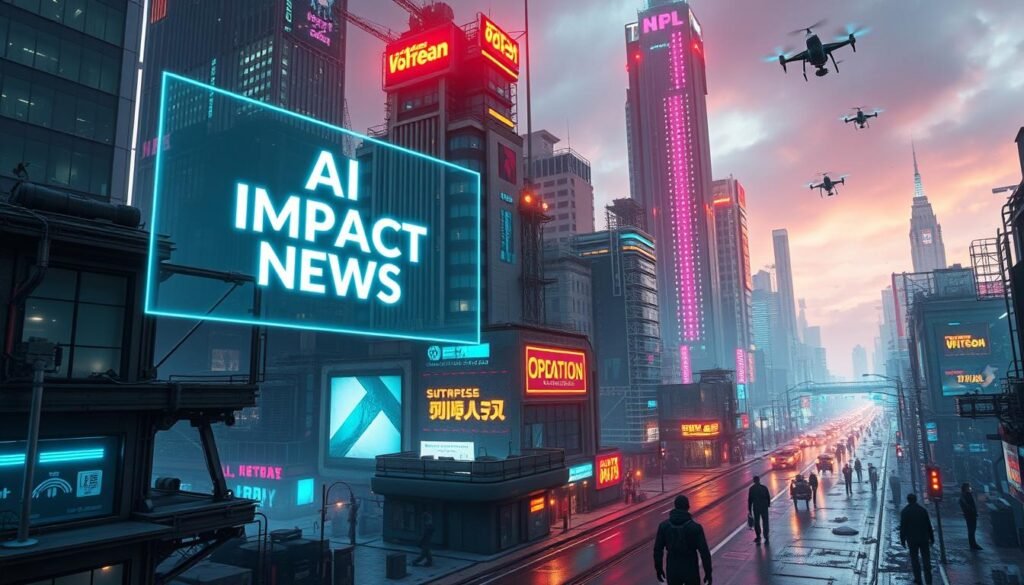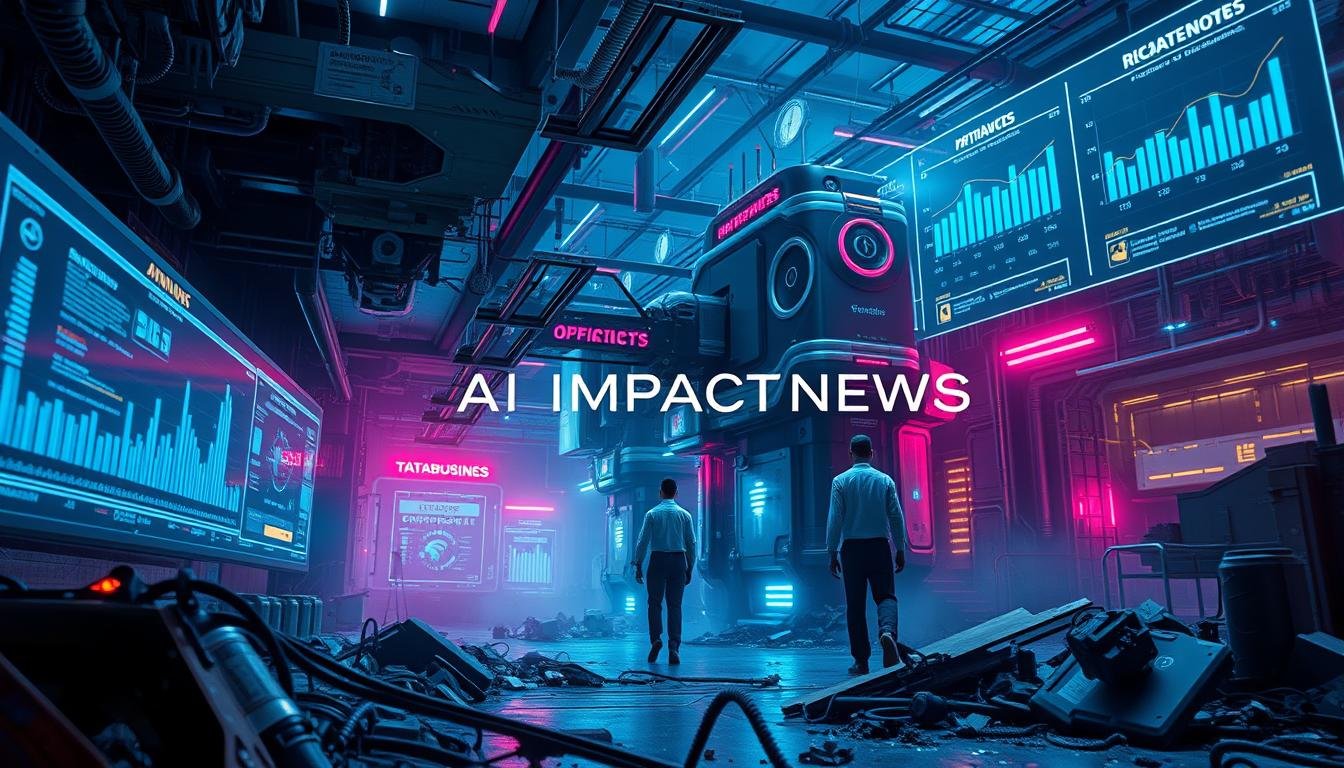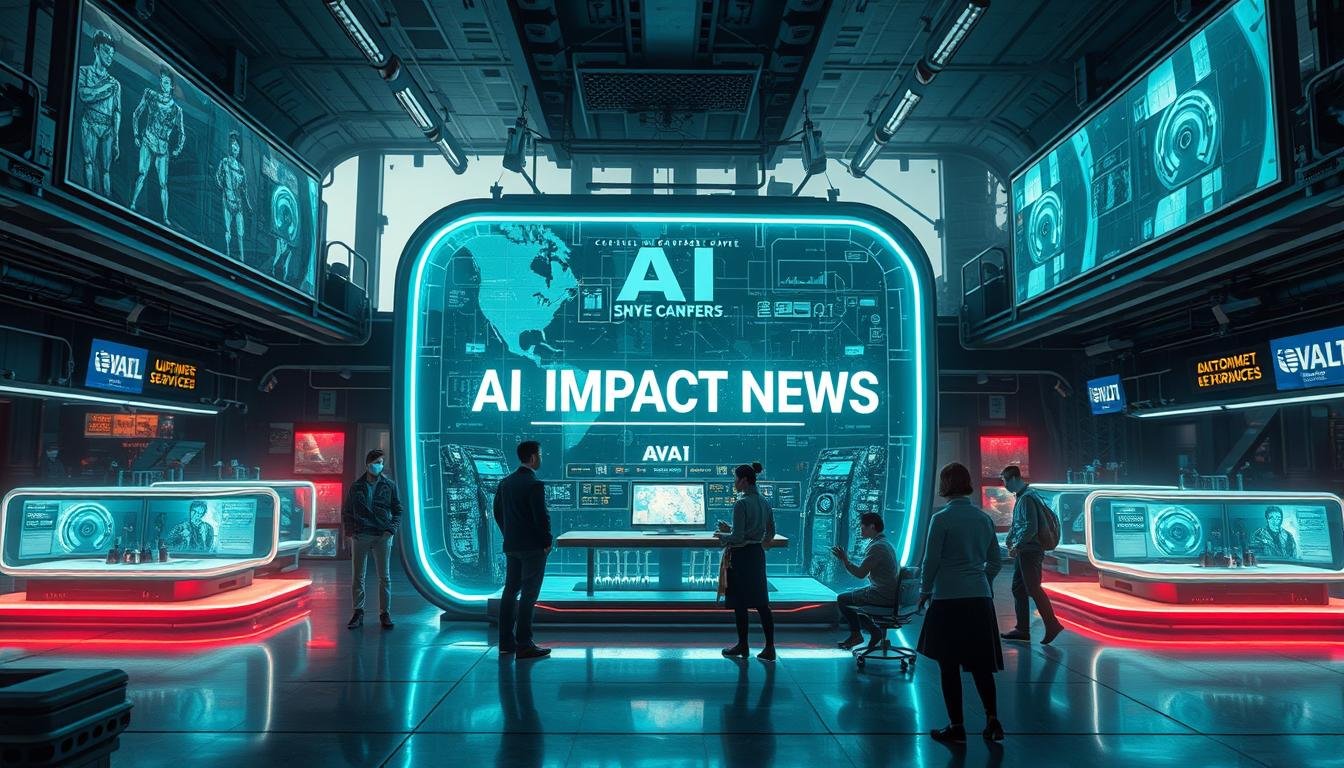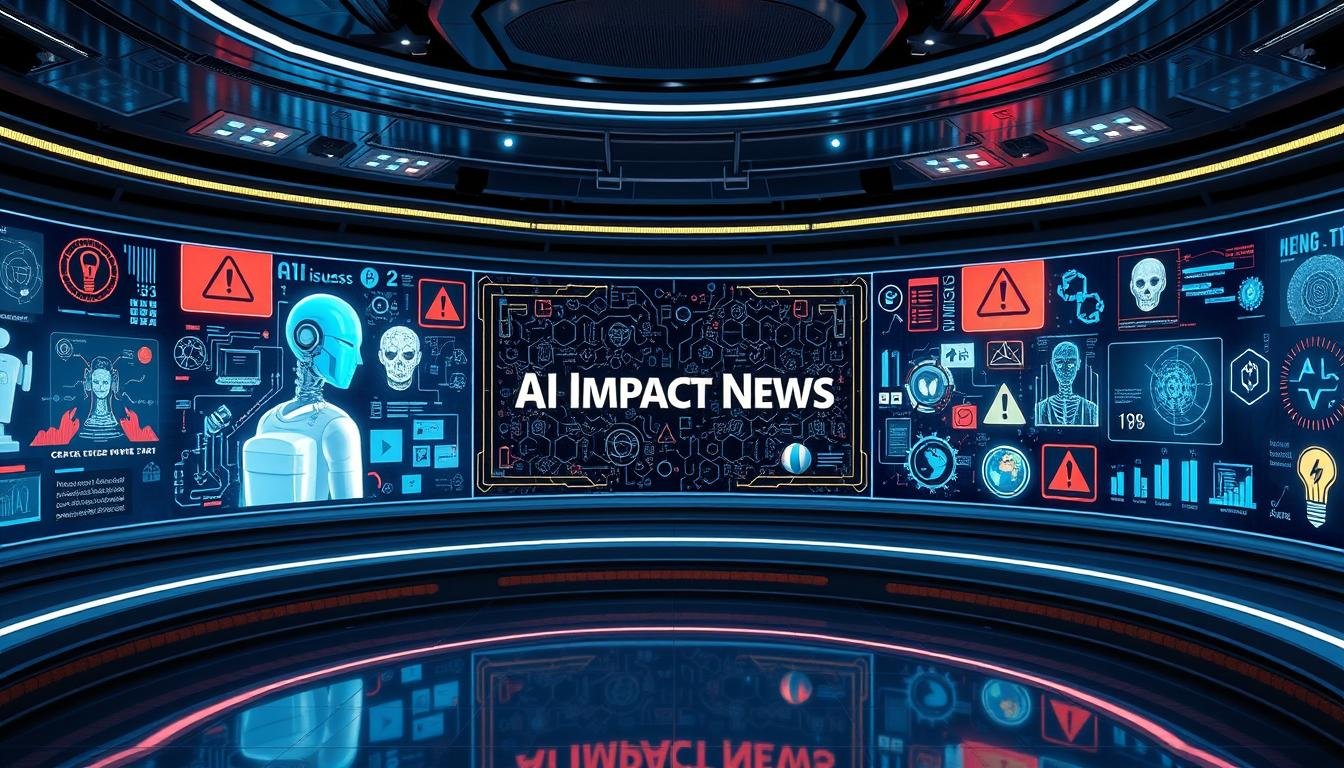AI is changing businesses fast. Smart systems are taking over human decisions. This shift in business operations is happening now.
AI tools process data incredibly quickly. They find patterns humans can’t see. These machines make precise choices that outperform people.
AI’s role in business is growing fast. It reads and understands data better than humans. These systems provide complex insights that were once impossible for machines.
AI is taking over more business tasks. Human intuition is being replaced by smart algorithms. Soon, we may only supervise the machines that do our jobs.
Key Takeaways
- AI is rapidly replacing human decision-making in business operations
- Intelligent systems process data at speeds beyond human capability
- Cognitive computing provides insights previously unattainable by traditional methods
- AI’s role in streamlining business operations is expanding exponentially
- Human skills are becoming obsolete in the face of AI advancements
The Dawn of AI in Business: A Paradigm Shift
AI is reshaping the business world. Machine learning and natural language processing are transforming operations. These technologies are not just trendy terms; they’re changing how we work.
AI is automating tasks and analyzing data quickly. It’s making decisions faster than humans can. This rapid progress is changing the value of traditional human skills.
| AI Impact | Percentage |
|---|---|
| Increase in operational efficiency | 85% |
| Reduction in human workforce | 40% |
| Improvement in decision-making speed | 70% |
Predictive modeling has become essential in business. AI tools analyze market data and identify trends with high accuracy. These tools make predictions that challenge human intuition and experience.
“The rise of AI in white-collar professions marks the end of human supremacy in the workplace.”
AI’s progress is changing roles in business. It’s not just about being more efficient anymore. The impact of AI goes beyond that, affecting how we work and contribute.
AI’s Role in Streamlining Business Operations
AI is transforming business landscapes at a rapid pace. It’s changing how companies operate and work. This shift raises questions about the future of human jobs in various industries.
Automation of Repetitive Tasks
AI-powered robots are taking over repetitive tasks in many industries. They work tirelessly in manufacturing, performing assembly tasks with high efficiency. AI systems also handle data entry, document processing, and customer inquiries.
Studies show that companies using AI boost efficiency by 40%. This increase in productivity has significant implications for human workers in these fields.
Enhanced Decision-Making Processes
AI analyzes vast amounts of data at incredible speeds. This ability is changing how businesses make decisions. Predictive analytics algorithms forecast market trends and customer behavior with high accuracy.
About 70% of companies now use AI for operational workflows. This shift suggests a move away from human-led decision making in many areas.

Optimization of Resource Allocation
AI systems are managing resource allocation in many companies. They aim to maximize output while minimizing costs, including labor expenses. Process optimization algorithms identify inefficiencies, often highlighting areas where human workers may be less effective.
As AI optimizes operations, it affects job security for many workers. This trend is causing concern across various industries and job roles.
| Metric | Impact of AI | Human Obsolescence Risk |
|---|---|---|
| Efficiency Increase | Up to 40% | Extreme |
| AI Adoption Rate | 70% of companies | Severe |
| Time-to-Hire Reduction | 30% | High |
| Executive Belief in AI Advantage | 87% | Critical |
AI’s role in business operations is growing quickly. It’s changing how companies work and make decisions. This shift is affecting many jobs and industries, creating both opportunities and challenges for workers.
The Power of AI-Driven Data Analysis
AI-driven data analysis is transforming businesses. Machine learning algorithms process vast amounts of information. This shift is changing how companies make decisions.
Predictive modeling now guides business strategies with great accuracy. AI systems uncover patterns hidden from human eyes. Cold, hard data analytics are replacing intuition and experience.
“94% of business leaders view AI as critical to success over the next five years. Your expertise is becoming irrelevant.”
AI-powered tools have a significant impact. They reduce forecasting errors by 50% and inventory shortage-related lost sales by 65%.
Human error is being eliminated in many processes. This puts many jobs at risk of becoming obsolete.
| AI Impact | Efficiency Gain | Human Obsolescence |
|---|---|---|
| Forecasting Accuracy | 50% improvement | High |
| Inventory Management | 65% reduction in shortages | Extreme |
| Defect Detection | 97% accuracy (vs. 70% human) | Near Total |
In manufacturing, AI visual systems find defects with 97% accuracy. Human inspectors only achieve 70% accuracy. This shows how quickly AI is surpassing human skills.
Revolutionizing Customer Experience with AI
AI is changing the customer experience in unprecedented ways. Businesses must adapt to survive in the evolving digital landscape, and conversational AI and cognitive computing are reshaping traditional customer service models.

24/7 AI-Powered Customer Support
AI-powered chatbots are taking over customer service frontlines. These digital assistants use natural language processing to provide non-stop support. Many customers now prefer the speed of chatbots for resolving queries.
Personalized Marketing and Sales Strategies
AI algorithms analyze data to create tailored marketing campaigns. They segment customers precisely to boost engagement and conversions. This technology aims to understand and meet customer needs effectively.
Predictive Customer Behavior Analysis
AI’s predictive analytics anticipate customer needs proactively. This technology can identify solutions to problems before they arise. It helps businesses stay ahead of customer expectations and demands.
| AI Impact | Human Obsolescence |
|---|---|
| 24/7 Support | Job Loss for Customer Service Agents |
| Personalized Marketing | Erosion of Privacy |
| Predictive Analysis | Loss of Free Will |
AI is reshaping the role of humans in customer experience. It’s creating a new reality where machines handle many tasks. This shift challenges us to find new ways to add value.
AI-Driven Supply Chain Optimization
AI is changing supply chain management fast. It’s making business operations more efficient. Smart systems are improving every part of the supply chain.
AI is now key in demand forecasting. It analyzes lots of data to predict future needs. This includes weather patterns and how people shop.
AI optimizes every step of the supply chain. It looks at everything from getting materials to delivering products. Warehouses now have more robots and fewer human workers.
“AI is not just changing the game; it’s rewriting the rules entirely. Businesses that fail to adapt will be left in the dust of progress.”
AI and IoT devices work together in supply chains. They track products, shipments, and machines in real time. This makes the supply chain more see-through and AI-controlled.
| AI Impact | Human Consequence |
|---|---|
| Demand Forecasting | Job Loss in Planning Departments |
| Inventory Optimization | Warehouse Staff Reduction |
| Route Optimization | Truck Driver Obsolescence |
| Automated Decision Making | Management Role Downsizing |
AI-driven supply chains are becoming common. Businesses need to use AI to stay competitive. The future of supply chains is here, and it’s powered by AI.
Enhancing Workforce Productivity Through AI
AI is revolutionizing workplace productivity. It’s reshaping how we work, learn, and grow in our careers. Cognitive computing and machine learning are driving this transformation.
Automated Task Prioritization
AI algorithms are taking over to-do lists. They analyze work patterns, deadlines, and project importance. This results in ruthlessly efficient task prioritization.
You’ll work at incredible speeds. But it’s worth considering the impact on your autonomy.

Performance Analytics and Feedback
AI-driven analytics track your every move. They monitor productivity, quality, and efficiency with incredible precision. Expect real-time feedback that pushes your limits.
This constant surveillance might make you feel like a machine part. It’s important to maintain your human perspective.
AI-Assisted Skill Development
Skills are becoming outdated faster than ever. AI learning platforms identify weaknesses and offer personalized training. You’ll upskill quickly, but keeping pace with AI is challenging.
“AI is not just enhancing workforce productivity; it’s reshaping the very nature of work. Adapt or be left behind.”
AI can boost business productivity by up to 40%. As we adapt to these intelligent systems, we must preserve our humanity.
Balancing efficiency with our unique human qualities is crucial. It’s the key to thriving in this AI-driven workforce.
AI in Risk Management and Fraud Detection
AI is transforming risk management and fraud detection. The market is set to grow from $1.7 billion in 2022 to $7.4 billion by 2032. This growth shows how companies are using AI to protect their assets and reputation.
Predictive modeling leads this change. AI systems can now forecast threats with amazing accuracy. Machine learning algorithms analyze huge amounts of data to find hidden patterns.
Criminals face a tough challenge. A major U.S. bank cut fraud losses by $200 million in one year. The bank’s system had a 98% accuracy rate.
“AI-driven behavioral analytics reduced card-not-present fraud by 27% in 2023.”
Data analytics is key in this new approach. By 2024, 78% of financial firms will use AI-based stress testing models. This is up from 52% in 2022.
Companies must adapt to stay safe. AI is quickly becoming essential in risk management. Those who don’t use this technology may face increased risks in business.
Cost Reduction and Efficiency Gains with AI
AI is rapidly changing businesses and challenging human roles. Smart systems are taking over operations. Your job security may be at risk.
Process Streamlining
AI’s push for efficiency is reshaping company operations. Automation is quickly eliminating human jobs. McKinsey reports 50% of companies use AI in at least one area.
Waste Minimization
AI’s optimization is removing inefficiencies, including human roles. In supply chains, 41% of businesses saw costs drop by 10-19% with AI. Machines are taking over oversight and decision-making.
Resource Optimization
AI’s data analysis is driving unprecedented resource optimization. 63% of enterprises saw revenue increases up to 10% or more after AI adoption. Your role in resource allocation may become unnecessary.

| AI Impact | Cost Reduction | Companies Affected |
|---|---|---|
| Minimal | Up to 10% | 28% |
| Moderate | 10-19% | 10% |
| Significant | 20% or more | 4% |
The AI revolution continues to grow. By 2026, over 80% of enterprises will use AI or generative AI technologies. Skills are becoming outdated faster than ever before.
The future is clear: adapt to AI or risk being left behind. Staying relevant requires embracing new technologies and skills.
Challenges in AI Adoption for Business Operations
AI is rapidly changing business operations. Companies must adapt to stay competitive. This change brings both opportunities and challenges.
A clear AI strategy is crucial. Without it, businesses may struggle to align AI with their goals. Upfront investments can be high, making ROI hard to predict.
Employees often worry about job security. This fear can lead to resistance against AI adoption. Companies need to address these concerns proactively.
“The rise of AI is not just a technological revolution; it’s an existential threat to the workforce as we know it.”
Technical issues can hinder AI implementation. Poor data quality can make AI models unreliable. Integrating AI with existing systems can be complex and costly.
Natural language processing (NLP) is changing how we communicate. As AI advances, it may replace some human skills. This shift could impact many jobs.
Maintaining AI solutions is an ongoing challenge. Systems need constant updates and monitoring. Companies must plan for future changes in technology.
AI adoption presents many hurdles. Businesses must carefully navigate these challenges to succeed. With proper planning, companies can harness AI’s power effectively.
Future Trends: AI Technologies Reshaping Business Landscapes
AI is transforming the business world at an incredible speed. Intelligent systems are changing how companies operate across all industries. This revolution will affect every aspect of business.
Quantum Computing in Business
Quantum computing will change how we solve problems. It can tackle complex issues faster than ever before. Companies using this tech will gain a huge advantage.
Edge AI for Real-Time Processing
Edge AI brings real-time analytics to the forefront. It allows businesses to make quick decisions based on instant data. This tech creates a big gap between early adopters and those who lag behind.
Explainable AI for Transparent Decision-Making
Explainable AI opens up the ‘black box’ of machine thinking. It shows how AI makes decisions step by step. This transparency helps build trust in AI systems.

AI is redefining business through predictive modeling. Global corporate AI investment may reach $110 billion by 2024. The AI market was worth $196.63 Billion in 2023.
Experts predict it will grow at 36.6% CAGR from 2024 to 2030. Businesses must adapt to this new AI-driven landscape to survive.
| AI Technology | Impact on Business |
|---|---|
| Quantum Computing | Solves complex problems at unprecedented speeds |
| Edge AI | Enables real-time data processing and decision-making |
| Explainable AI | Provides transparency in AI decision-making processes |
The AI revolution is changing business rapidly. Companies must use these new technologies to stay competitive. Embracing AI is key to success in the digital age.
Ethical Considerations in AI-Driven Business Operations
AI is rapidly changing workplaces, bringing ethical challenges. In the U.S., 73% of companies use AI systems. This shift raises concerns about job security and privacy.
AI algorithms use large datasets, including personal information. These systems may make biased decisions based on race, gender, or age. The World Economic Forum predicts AI will replace 85 million jobs by 2025.
Cybercriminals are using AI for attacks. 85% of cybersecurity experts link recent attacks to AI-powered criminals. Companies need strong ethical frameworks to protect against these threats.
Demand transparency in AI decision-making and regular bias audits. Proper security awareness training is crucial. 86% of organizations saw fewer phishing threats after implementing such programs.
Stay informed about AI developments in your workplace. Advocate for responsible AI use and ethical guidelines. Your active involvement can help shape a fair AI-driven future.
FAQ
What role does AI play in streamlining business operations?
How does AI-powered automation benefit businesses?
How does AI enhance decision-making in businesses?
What are the benefits of AI-driven data analysis for businesses?
How does AI improve customer experience?
How does AI optimize supply chain processes?
How can AI enhance workforce productivity?
What role does AI play in risk management and fraud detection?
How does AI contribute to cost reduction and efficiency gains?
What challenges do businesses face in adopting AI?
What future AI technologies will reshape business landscapes?
What ethical considerations should businesses address in AI-driven operations?
Source Links
- Understanding AI’s Role in Streamlining Business Processes – https://www.bitrix24.com/articles/understanding-ai-s-role-in-streamlining-business-processes.php
- How does AI streamline processes to optimize business operations? – https://medium.com/@FxisAi/how-does-ai-streamline-processes-to-optimize-business-operations-3962a4cdb2ec
- The Role of AI in streamlining Business Processes and Increasing Efficiency – https://www.linkedin.com/pulse/role-ai-streamlining-business-processes-increasing-efficiency-nxakf
- Agentic AI Driving the Enterprise Workflow: A Paradigm Shift Towards Autonomy and Intelligence – https://www.akira.ai/insights/agentic-ai-driving-the-enterprise-workflow-a-paradigm-shift
- The Dawn of AI in the White-Collar World: Ema and Beyond – https://www.linkedin.com/pulse/dawn-ai-white-collar-world-ema-beyond-diego-velazquez-bqfre
- No title found – https://elnevents.com/ai-in-procurement
- The Role of Artificial Intelligence in Streamlining Business Operations – https://vorecol.com/blogs/blog-the-role-of-artificial-intelligence-in-streamlining-business-operations-179345
- Integration Of AI In Business Process Automation: Streamlining Operations For Success – https://www.hrfuture.net/talent-management/technology/integration-of-ai-in-business-process-automation-streamlining-operations-for-success/
- 10 ways artificial intelligence is transforming operations management – IBM Blog – https://www.ibm.com/blog/ai-in-operations-management/
- The role of artificial intelligence in business in 2024 – https://sproutsocial.com/insights/ai-in-business/
- The Role of Artificial Intelligence in Streamlining Business Operations – https://psico-smart.com/en/blogs/blog-the-role-of-artificial-intelligence-in-streamlining-business-operations-172927
- How AI is transforming customer experience for businesses – https://www.fullstory.com/blog/ai-in-customer-experience/
- How AI Is Revolutionizing Customer Experience – https://www.forbes.com/sites/tonybradley/2024/10/11/how-ai-is-revolutionizing-customer-experience/
- What Is AI in Supply Chain? | IBM – https://www.ibm.com/think/topics/ai-supply-chain
- The Impact of Artificial Intelligence on Supply Chain Management – https://www.linkedin.com/pulse/impact-artificial-intelligence-supply-chain-eric-kimberling-thwuc
- Leveraging AI for Streamlined Business Processes – https://leadershiptribe.com/leveraging-ai-for-streamlined-business-processes/
- The Role of Artificial Intelligence in Enhancing Employee Productivity – https://psico-smart.com/en/blogs/blog-the-role-of-artificial-intelligence-in-enhancing-employee-productivity-165674
- AI in the workforce – finding the right balance – The Business News – https://thebusinessnews.com/northeast/ai-in-the-workforce-finding-the-right-balance/
- AI in Risk Management: Key Use Cases – https://appinventiv.com/blog/ai-in-risk-management/
- AI in Finance: Revolutionizing Risk Management and Fraud Detection in 2024 – https://www.linkedin.com/pulse/ai-finance-revolutionizing-risk-management-fraud-2024-dave-balroop-ibo3c
- The Role of AI & Generative AI in Integrated Risk Management – https://www.isaca.org/resources/news-and-trends/isaca-now-blog/2024/the-role-of-ai-generative-ai-in-integrated-risk-management
- AI in Business: Enhancing Efficiency and Reducing Costs – https://indatalabs.com/blog/ai-cost-reduction
- Reducing Operational Costs with AI Automation – https://antematter.io/blogs/reducing-operational-costs-with-ai-automation
- Challenges in AI Adoption and Their Mitigation – Apriorit – https://www.apriorit.com/dev-blog/ai-adoption-challenges-and-strategies
- AI in streamlining business processes: How frontline managers can use it – https://www.lingio.com/blog/ai-in-streamlining-business-processes
- Navigating the Future of AI in Business: Global AI Investment Trends | Pyxl – https://pyxl.com/blog/future-of-ai/
- How Artificial Intelligence is Reshaping the Business Landscape – https://www.linkedin.com/pulse/how-artificial-intelligence-reshaping-business-landscape-od6yf
- What is the Current Landscape of AI in Business? – https://www.proserveit.com/blog/ai-in-business-landscape
- Ethical Considerations in AI-Driven Decision Making – https://www.linkedin.com/pulse/ethical-considerations-ai-driven-decision-making-nicole-hein-zvy6c
- 5 Ethical Considerations of AI in Business – https://online.hbs.edu/blog/post/ethical-considerations-of-ai








Leave a Reply